Daily Vocabulary Words: List of Daily Used Words
Hi there. Welcome to this special section @ Wordpandit.
Our endeavour here is straightforward: highlighting important daily vocabulary words, you would encounter in The Hindu. This is your repository of commonly used words; essentially, we are posting a list of daily used words. Hence, this has significant practical application as it teaches you words that are commonly used in a leading publication such as The Hindu.
Visit the website daily to learn words from The Hindu.
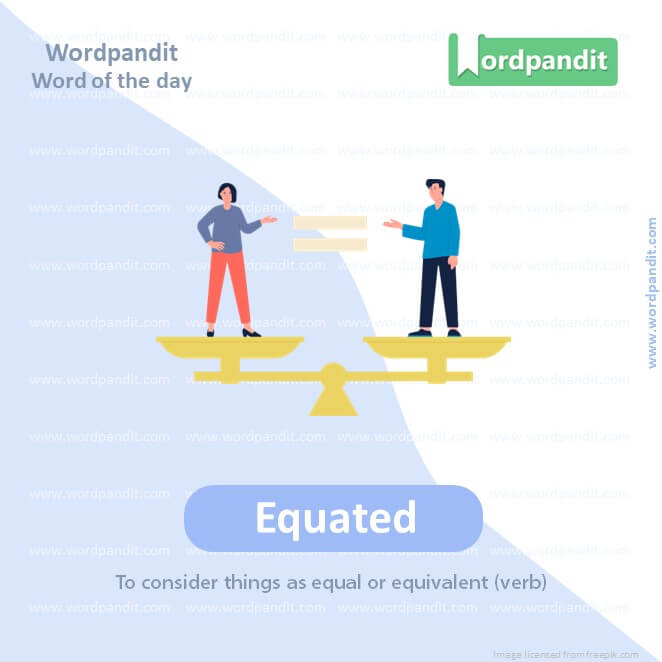
WORD-1: Equated
CONTEXT: The justification for this move — CPR’s publications have been equated with current affairs programming, prohibited for an entity using FCRA funds — is nothing if not farcical.
SOURCE: The Hindu
EXPLANATORY PARAGRAPH: Imagine you have two different toys, but you love them both the same. When you say they are equal, you’re saying they are the same in how much you like them. ‘Equated’ is like saying two things are equal or the same in some way.
MEANING: To consider things as equal or equivalent (verb).
PRONUNCIATION: ih-kway-tid
SYNONYMS: Matched, likened, compared, paralleled, associated, correlated
USAGE EXAMPLES:
1. She equated happiness with having a lot of money.
2. In his mind, he equated success with hard work.
3. The teacher equated the new concept with something we already knew.
4. They equated the two different events in history.
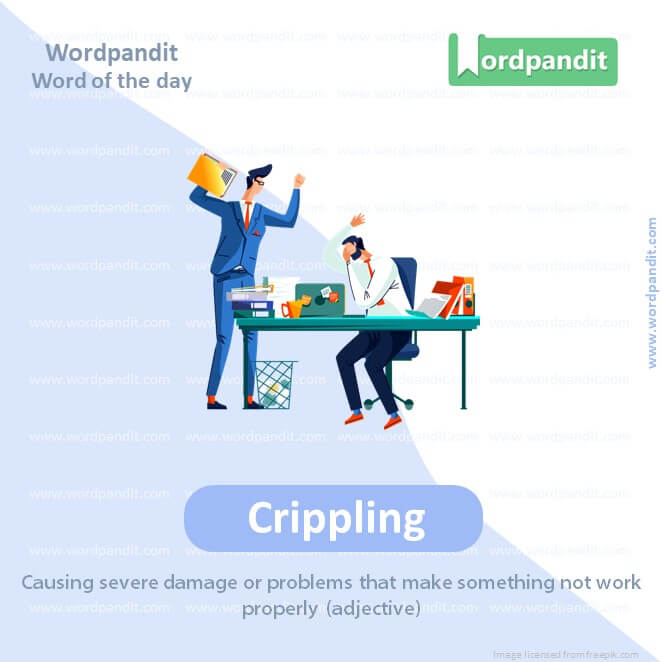
WORD-2: Crippling
CONTEXT: A decision to effectively shut down such an institution by crippling its finances is bound to send the message that India is no longer open to the free flow of knowledge and ideas.
SOURCE: The Hindu
EXPLANATORY PARAGRAPH: If something is crippling, it’s like it’s so strong or bad that it makes it hard for you to do things. Like if you have a really bad leg ache, it might be crippling because it’s hard to walk.
MEANING: Causing severe damage or problems that make something not work properly (adjective).
PRONUNCIATION: krip-ling
SYNONYMS: Disabling, paralyzing, incapacitating, devastating, debilitating, damaging
USAGE EXAMPLES:
1. The disease had a crippling effect on her health.
2. He was left with a crippling debt after his business failed.
3. The crippling anxiety made it hard for her to speak in public.
4. The storm caused crippling damage to the town.
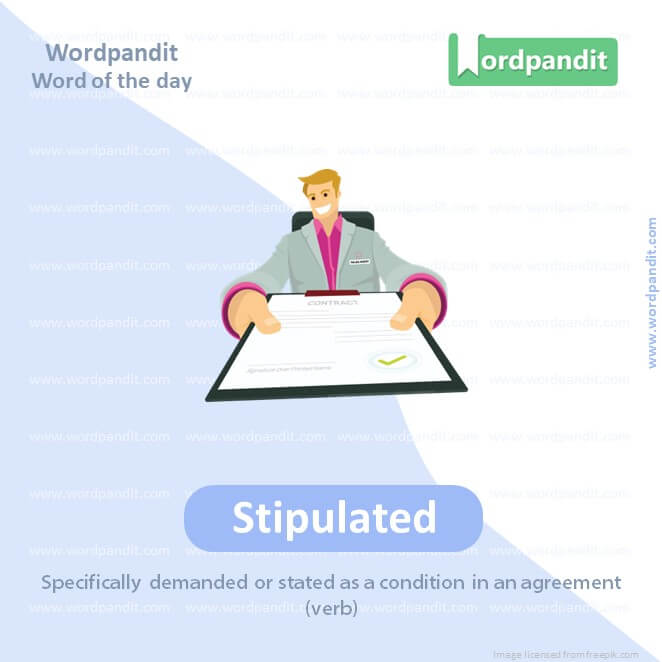
WORD-3: Stipulated
CONTEXT: Shortly after the stipulated time, reports from JAXA indicated the lander had touched down but its solar panels were not producing power, forcing the craft to bank on its batteries.
SOURCE: The Hindu
EXPLANATORY PARAGRAPH: Stipulated is like making a special rule or a promise about something. If you and your friend stipulate that you’ll share your toys, it means you’ve both agreed to do that.
MEANING: Specifically demanded or stated as a condition in an agreement (verb).
PRONUNCIATION: stip-yoo-lay-tid
SYNONYMS: Specified, demanded, required, insisted, set, dictated
USAGE EXAMPLES:
1. The contract stipulated a delivery date.
2. They stipulated that everyone must wear a helmet.
3. The teacher stipulated that all assignments be turned in on time.
4. The rules stipulated that players must wear shoes.
WORD-4: Interplanetary
CONTEXT: Chandrayaan-3, was tasked with a lunar soft-landing and deploying a rover mission (with two small rovers) but its primary mission was pioneering. Thus far, interplanetary spacecraft to the moon and Mars have been assigned suitable landing areas several hundred metres wide.
SOURCE: The Hindu
EXPLANATORY PARAGRAPH: Interplanetary is a big word that means between planets. Like if a spaceship goes from Earth to Mars, it’s traveling on an interplanetary journey!
MEANING: Relating to or occurring between different planets (adjective).
PRONUNCIATION: in-ter-plan-it-air-ee
SYNONYMS: Extraterrestrial, space, cosmic, astro, Martian, lunar
USAGE EXAMPLES:
1. They studied interplanetary travel at the space center.
2. The movie was about an interplanetary adventure.
3. Scientists are exploring interplanetary dust.
4. The book discussed interplanetary communication.
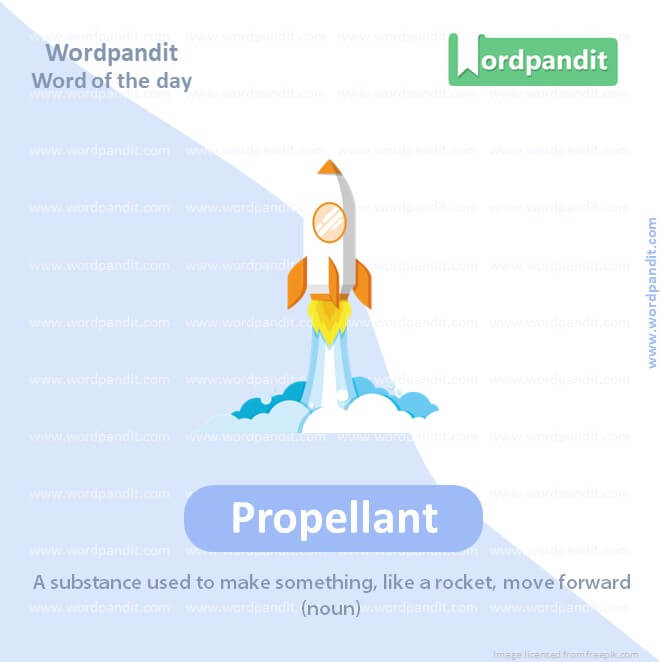
WORD-5: Propellant
CONTEXT: a private U.S. company, and funded by NASA, reentered the earth’s atmosphere following a propellant leak.
SOURCE: The Hindu
EXPLANATORY PARAGRAPH: Propellant is a special kind of material that helps rockets or things move really fast, like the fuel that helps a car go but for rockets or sprays.
MEANING: A substance used to make something, like a rocket, move forward (noun).
PRONUNCIATION: proh-pel-uhnt
SYNONYMS: Fuel, booster, accelerant, rocket fuel, charge, motor
USAGE EXAMPLES:
1. The rocket’s propellant helped it launch into space.
2. They tested different types of propellant for the engines.
3. The spray can uses a gas as a propellant.
4. Finding a more efficient propellant is important for space travel.
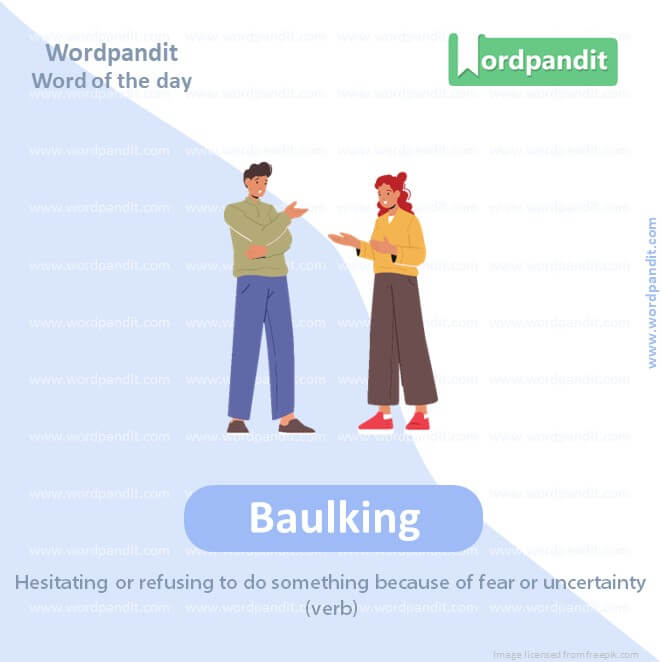
WORD-6: Baulking
CONTEXT: Shippers are not baulking at taking the long, circuitous voyage around Africa.
SOURCE: The Hindu
EXPLANATORY PARAGRAPH: Baulking is when you stop or don’t want to do something because you’re scared or unsure. Like when you don’t want to jump into the pool because the water looks cold.
MEANING: Hesitating or refusing to do something because of fear or uncertainty (verb).
PRONUNCIATION: baw-king
SYNONYMS: Hesitating, flinching, recoiling, shrinking, wincing, faltering
USAGE EXAMPLES:
1. She was baulking at the idea of jumping from the high dive.
2. The horse kept baulking at the fence.
3. He baulked at the last minute from signing the contract.
4. They were baulking at the high price of the tickets.
WORD-7: Transshipment
CONTEXT: Containers in the south typically find their way to the Colombo transshipment container terminal via Chennai, Tuticorin/Thoothukudi and so on.
SOURCE: The Hindu
EXPLANATORY PARAGRAPH: Transshipment is like moving something from one place to another, especially using different types of transport. Like taking toys from a truck and putting them on a boat to go somewhere else.
MEANING: The transfer of goods from one form of transportation to another during their journey (noun).
PRONUNCIATION: trans-ship-ment
SYNONYMS: Transfer, conveyance, shipping, transportation, relocation, carriage
USAGE EXAMPLES:
1. The cargo underwent transshipment at the port.
2. Transshipment is common in international trade.
3. The goods were delayed during transshipment.
4. Efficient transshipment is key to quick delivery.
WORD-8: Unfettered
CONTEXT: girls use the devices equally well as boys when they are given equal and unfettered access to the devices.
SOURCE: The Hindu
EXPLANATORY PARAGRAPH: Unfettered means you are free and no one is holding you back. It’s like when you can play outside without anyone telling you what to do.
MEANING: Not controlled or restricted (adjective).
PRONUNCIATION: un-fet-erd
SYNONYMS: Unrestricted, free, unbound, unshackled, liberated, unchained
USAGE EXAMPLES:
1. He enjoyed his unfettered freedom on vacation.
2. The artist wanted to create with unfettered imagination.
3. Unfettered access to information is important.
4. She loved the feeling of unfettered joy.
WORD-9: Infringement
CONTEXT: The Court held that telephonic conversations are often of an intimate and confidential character and, since phone tapping is an infringement of the right to freedom of speech and expression under Article 19 of the Constitution, it is permissible only if it comes within the grounds of restrictions under Article 19(2).
SOURCE: The Hindu
EXPLANATORY PARAGRAPH: Infringement is when someone does something that breaks a rule or law. It’s like when someone plays a game but doesn’t follow the rules.
MEANING: The act of breaking a law or agreement (noun).
PRONUNCIATION: in-frinj-ment
SYNONYMS: Violation, breach, transgression, encroachment, trespass, contravention
USAGE EXAMPLES:
1. Copying someone else’s work is an infringement of copyright.
2. There was an infringement of the traffic rules.
3. The court ruled that it was an infringement of rights.
4. The company was sued for patent infringement.
WORD-10: Comprehend
CONTEXT: The Court also elaborated upon parameters to comprehend the occurrence of ‘public emergency’ and ‘public safety’, and clarified that unless one of these two conditions is met, interception cannot be resorted to, no matter howsoever necessary or expedient it
SOURCE: The Hindu
EXPLANATORY PARAGRAPH: Comprehend is when you understand something really well. Like when you listen to a story and you know exactly what it’s about.
MEANING: To understand or grasp the meaning of something (verb).
PRONUNCIATION: kom-pri-hend
SYNONYMS: Understand, grasp, fathom, perceive, discern, apprehend
USAGE EXAMPLES:
1. She couldn’t comprehend the complex math problem.
2. It’s important to comprehend the instructions before starting.
3. He read the book but didn’t comprehend its message.
4. To solve the puzzle, you must first comprehend the clues.
Vocabulary
Language is a confluence of thoughts, emotions, and experiences that find vibrant expression through words. In this spectrum, ‘vocabulary’ shines as a critical aspect that shapes and directs our language proficiency. It offers depth, nuance, and clarity to our expressions. However, mastering ‘vocabulary’ is an art that requires a strategized approach.
An intensive strategy for learning ‘vocabulary’ goes beyond the limiting precincts of memorization. Instead, it nudges learners towards comprehension and application. To understand ‘vocabulary’, take a step forward from traditional textbooks and classroom sessions, and embrace the vast world of books, articles, podcasts or digital content in the language you are learning. This step allows you to understand words in context, see how they are used in different situations, and absorb words as part of the natural flow of language.
As you journey through ‘vocabulary’, remember that this expedition should not be a race. Rather, it’s a marathon where pacing yourself is pivotal to long-term success. Learning a few words each day and consolidating your knowledge through regular revision tends to be more effective, as it prevents cognitive overload and promotes solid retention.
Interactive learning tools can provide valuable support in assimilating ‘vocabulary’. Use of flashcards, language-learning apps, or memory-enhancing software can make this process more engaging and effective, reinforcing the ‘vocabulary’ in your memory.
Lastly, practice is an incontrovertible part of mastering ‘vocabulary’. Utilize the learnt vocabulary in your daily conversations, write-ups, or presentations to ensure an active application. Doing this fosters recall and cements understanding.
In summation, learning ‘vocabulary’ is a journey that should be embraced with an integrated approach, where understanding and application are the key elements. By engaging with diverse learning resources, pacing the learning process, employing interactive learning tools, and practicing regularly, the journey of mastering ‘vocabulary’ becomes a fulfilling and enriching experience.













